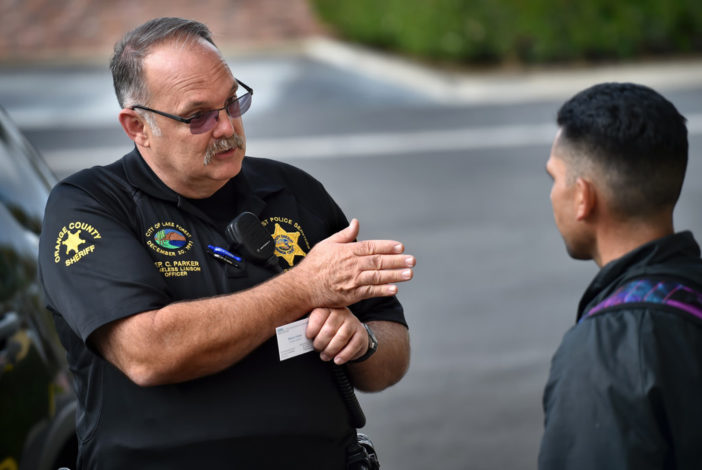Robert once had a wife and life in the city. He owned a condo, was a computer programmer and generally appeared to have a normal life.
And then something happened, and he lost everything.
Impossible to know for sure, Orange County Sheriff’s Department Homeless Liaison Officer Deputy Chet Parker can only guess it had something to do with his mental illness — a combination of schizophrenia and bipolar disorder.
“Another one of those guys that’ll rip your heart out,” Parker says of the many stories he hears speaking to the Lake Forest-area homeless population every day. “He’ll drink until he cannot stand up.”
Despite the mental illness and alcoholism, Robert is friendly and talkative with Parker, as well as other deputies that stop by to check on him on this Tuesday morning.
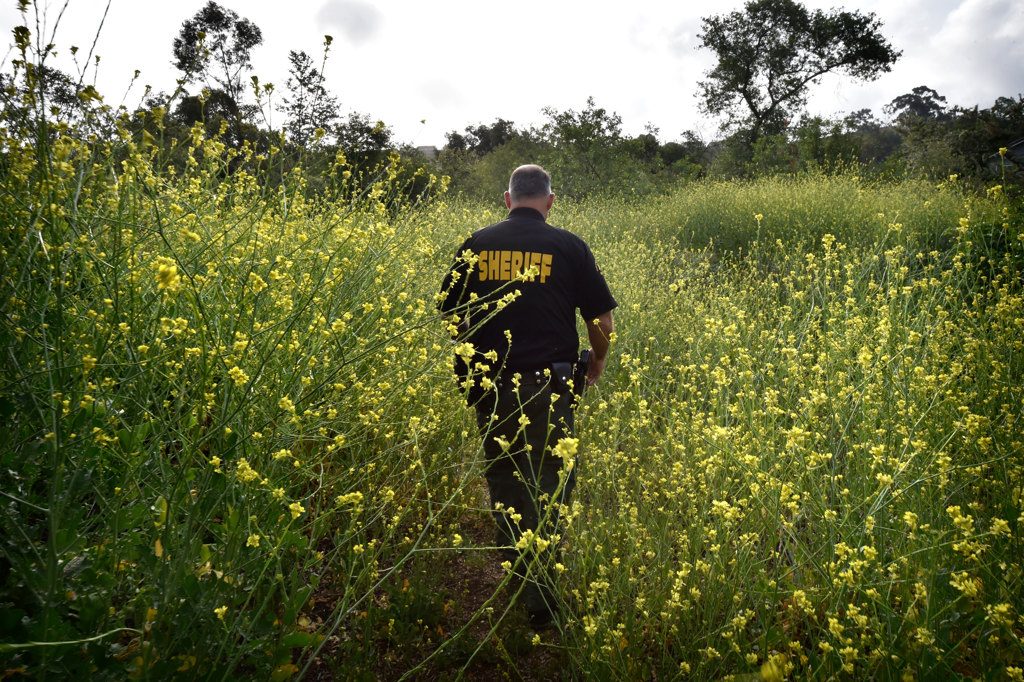
Homeless Liaison Officer Deputy Chet Parker makes his way through mustard grass to check on a homeless person currently living along the Serrano Creek Trail in Lake Forest.
Photo by Steven Georges/Behind the Badge OC
“I’m proud of you,” he tells Parker regarding the deputy’s recent designation as Officer of the Year by the OCSD.
Today Robert is feeling particularly welcoming of assistance – talking about seizures he’s been having and a need to adjust his medication.
“I just gotta stop drinking,” Robert says, chastising himself.
Parker jumps on the opening Robert gives to call up some program coordinators to find about the availability of housing for the homeless man. The HLO has been working to get Robert into assistance programs for 18 months now, and he hopes today is the day he can finally make that happen.
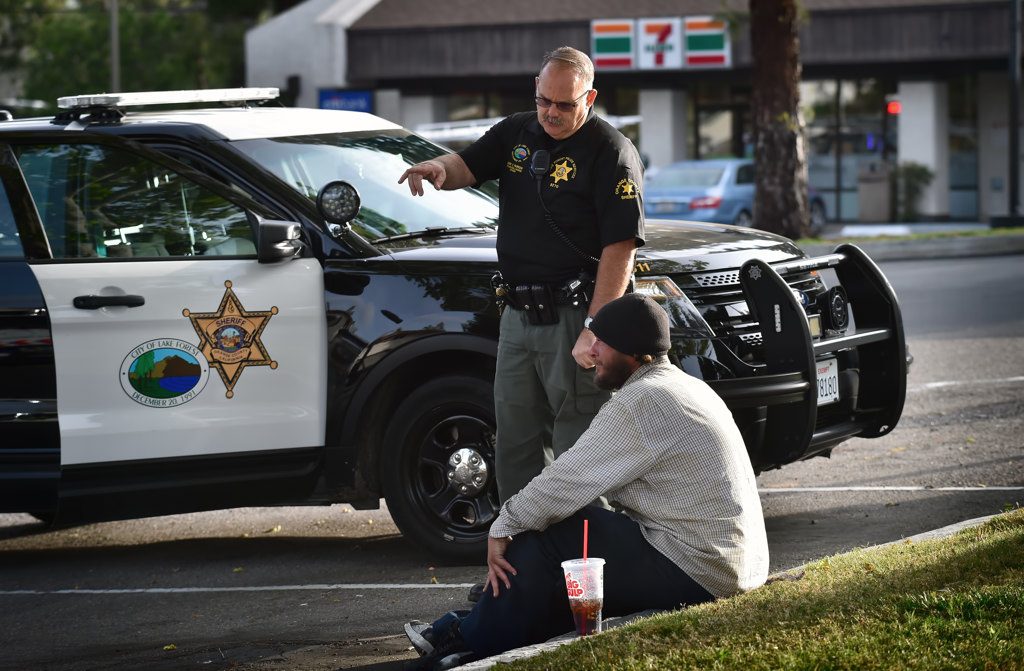
Homeless Liaison Officer Deputy Chet Parker tries to get Robert, a former computer programmer who is now on the street, into a program that can help him. Parker later acquires new clothes for him donated by a local businessman to increase his chances of being accepted into the program.
Photo by Steven Georges/Behind the Badge OC
It’s a tale Parker is all too familiar with: men and women living on the streets for a wide variety of reasons, but all similarly apprehensive about the prospect of leaving the safety of their car, corner of a parking lot or other place where they’ve made their temporary home.
“It’s just human nature staying comfortable where you’re at,” Parker says.
In his 25th year working for the OCSD and third year as an HLO, Parker didn’t plan to become Lake Forest’s police liaison to the homeless population, but after his chief asked him to give it a try, he never looked back. It’s a job he seems born to do.
Looking to check in with some regulars, he heads to the city’s Wal-Mart parking lot. Here he runs into Jose, a Navy veteran living out of his ’66 Ford Fairlane.
“It was my grandfather’s car,” says Jose.
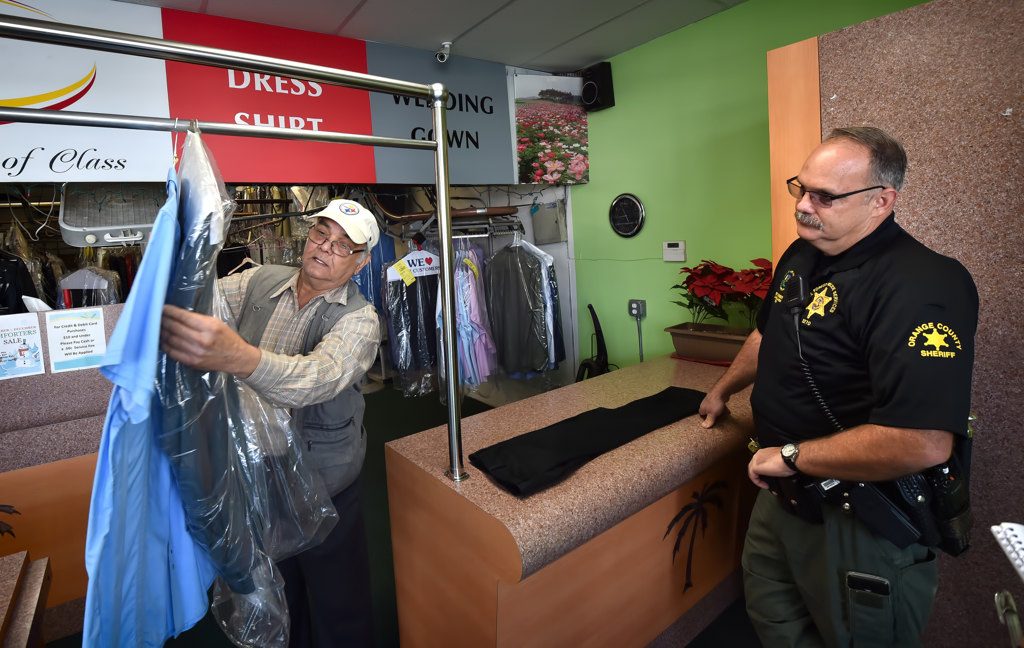
Usman Ahmad, owner of UR Cleaners in Lake Forest, donates clothes for “Robert” after Homeless Liaison Officer Deputy Chet Parker told him of his need to get Robert into a program and off the street.
Photo by Steven Georges/Behind the Badge OC
Jose has been living out of his car since January of last year. Parker explains that he makes too much money from his veteran’s pension to qualify for many services but not enough to actually live on.
“He’s like in this dead zone,” says Parker.
After chatting with Jose about how he’s feeling – he recently made a trip to the ER for pain and swelling in his leg – and making sure he wasn’t in need of any other immediate services (“You’re doing OK as far as food goes?”), Parker says goodbye and continues searching the lot.
He spots a black Toyota Camry parked in the back area of the lot. Before heading over to talk to whoever is in the car, he makes sure to run the license plates to check for warrants and possible criminal activity. Finding none, he walks over and finds a young man sleeping in the car.
“He’s new,” Parker says upon returning to his patrol car to fish out some food and social services cards. “He’s a nice kid – he’s only been homeless for about six weeks, which is the perfect time to get him off the streets.”
At about that time is when the newly homeless start to really feel the aches and pains of sleeping in the car and begin to tire of being stinky, Parker adds.
Parker learns the young man has an addiction issue.
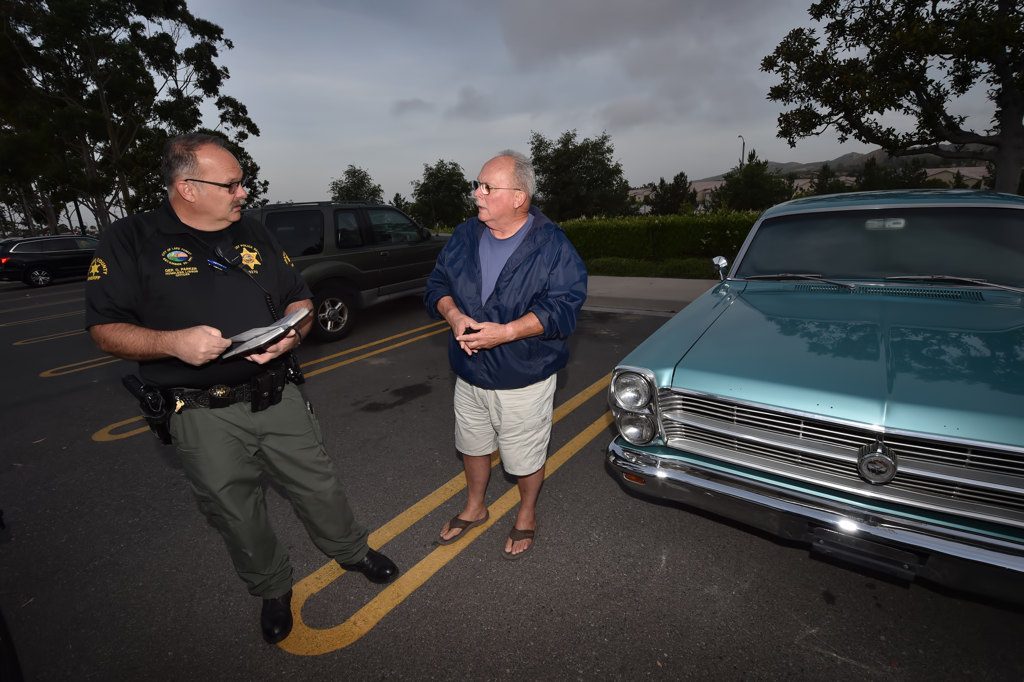
OCSD Homeless Liaison Officer Deputy Chet Parker checks up on Jose, a veteran currently living out of his 1966 Ford Fairlane, as he tries to get him the help he needs.
Photo by Steven Georges/Behind the Badge OC
“He’s running from his addiction,” Parker says. The man told Parker he left his hometown to try and get away from friends who do drugs there.
Though Parker knows he can get him into a program this afternoon, the young man isn’t ready for that.
“If you can get them to tell you their story and you can mesh them together with a program that will accept them … I load them in the car and I take them [for program services],” Parker says.
He says his job is all about communication – with individuals on the streets as well as program coordinators – and keeping up with all available services and their requirements, which literally can change overnight.
“Part of the problem is you have to get them to talk to you,” says Parker.
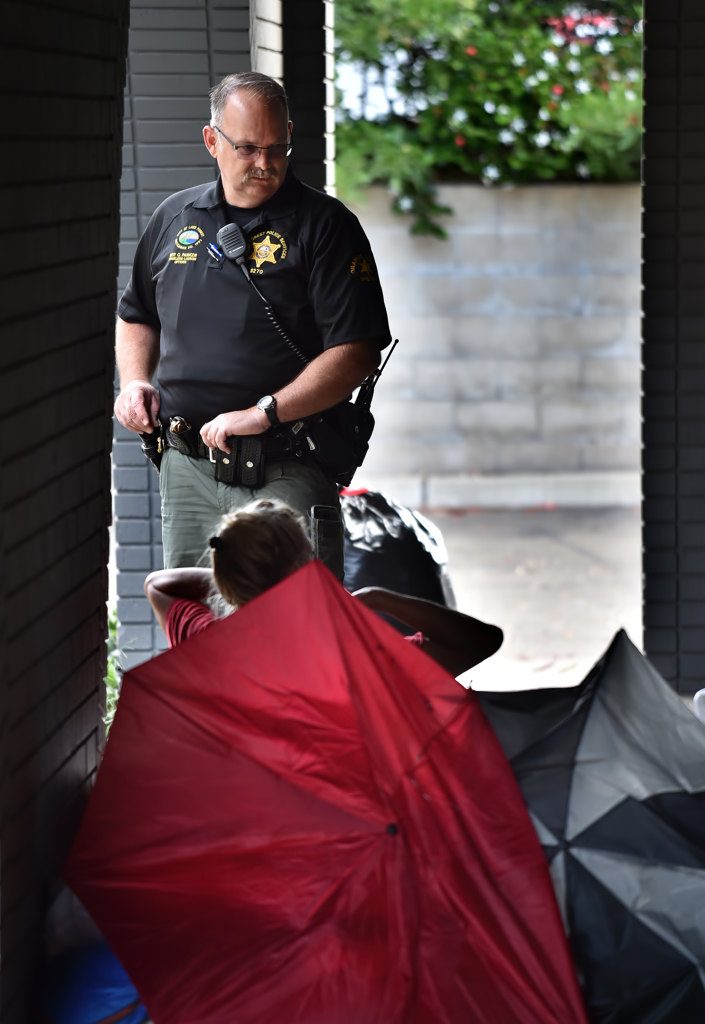
Homeless Liaison Officer Deputy Chet Parker checks in on Diann, who is living next to a business building that is currently vacant.
Photo by Steven Georges/Behind the Badge OC
Another important component of what Parker does is networking with local business owners. In fact, Parker has a healthy network of businesses that donate everything from sandwiches to haircuts.
“There are a lot of homeless people,” says UR Cleaners owner Usman Ahmad. “I’m willing to give them as many clothes as I can.”
The Lake Forest dry cleaner is one of Parker’s go-to spots for finding donated clothing (in this case, long-forgotten dry cleaning) for the homeless in the community. On this day, Ahmad found a couple of dress shirts and some slacks for Robert, who needed to clean up if he was to enter a facility Parker had lined up.
The only thing left was to find Robert again to give him the fresh clothes. It took some doing, but Parker finally located the man at one of his regular spots at a recycling center.
Since becoming the Lake Forest HLO three years ago, Parker has helped 51 members of the city’s homeless population get off the streets.
“If we could get Robert today, it would be 52,” Parker says.
By close to midday, Robert became No. 52.
 Behind the Badge
Behind the Badge
